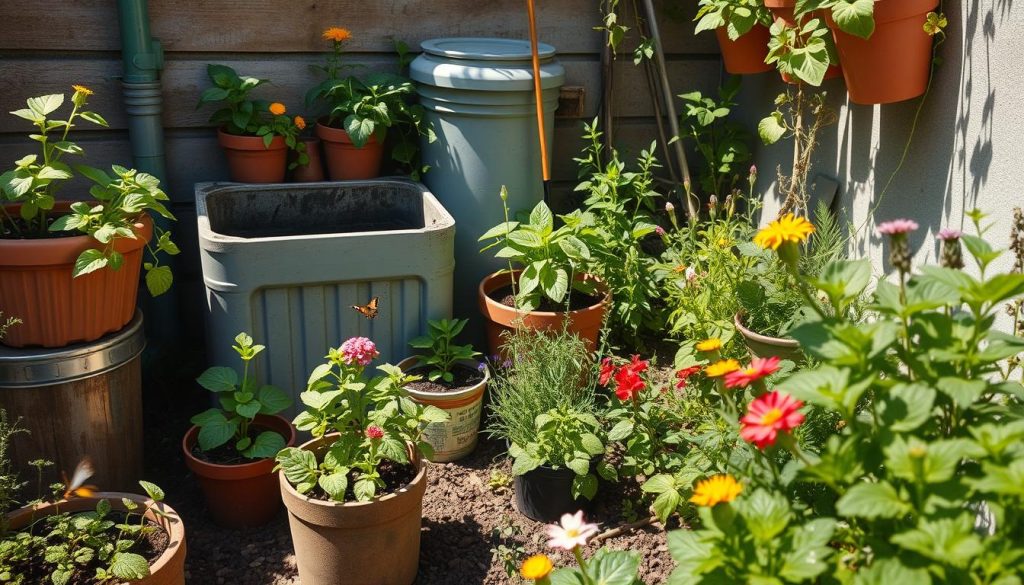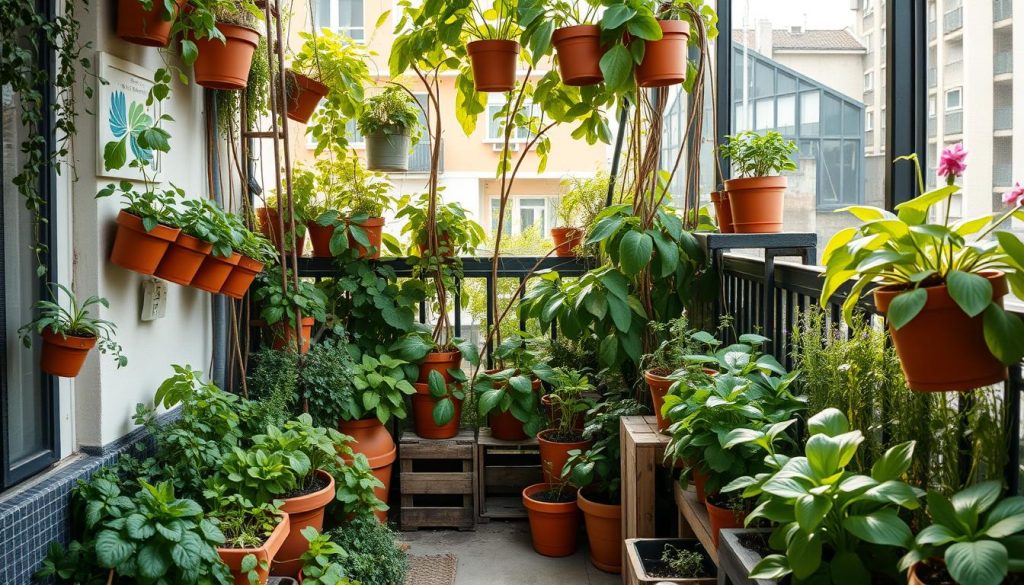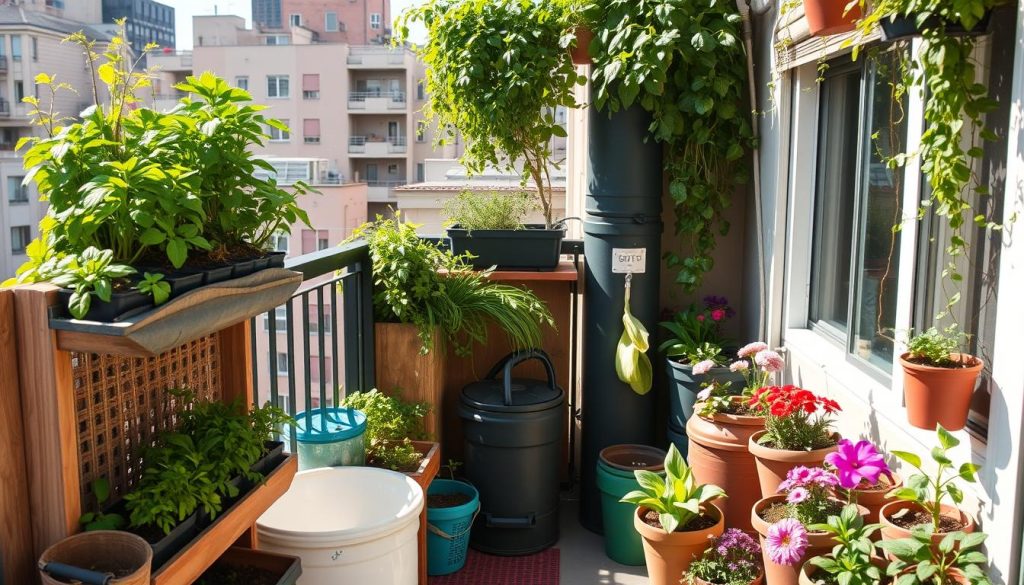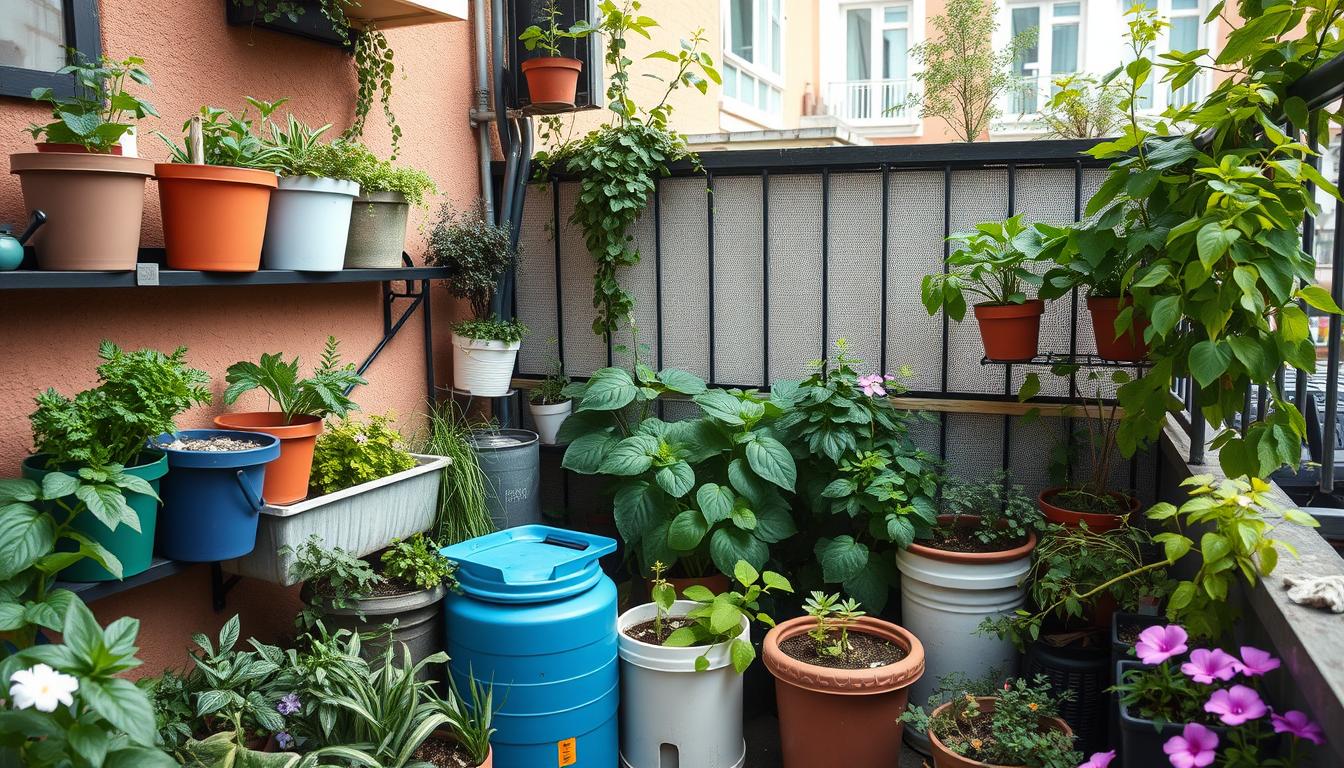I’m excited to share my top tips for zero-waste gardening in small spaces. This practice combines sustainable and eco-friendly gardening to reduce waste. It helps minimize environmental impact. By following these strategies, you can create a beautiful garden that brings joy and helps the planet.
As someone who loves sustainable living, I’ve found that zero-waste gardening is key. It’s about being mindful of resources and waste. Using eco-friendly products and saving water makes your garden stunning and green.
Starting zero-waste gardening in small spaces is easier than you think. Simple changes to your routine can make a big difference. In this article, I’ll share my favorite tips for a small, eco-friendly garden.
Understanding Zero-Waste Gardening Principles
Exploring urban gardening, I’ve learned the value of zero-waste practices. These methods not only cut down on waste but also make my garden more eco-friendly. By adopting zero-waste gardening, I’ve saved water, lowered my carbon footprint, and grown a stunning garden in a small space.
In urban gardening, using space wisely is key. Techniques like vertical or container gardening help me grow many plants. This way, I reduce waste and lower my environmental impact. Zero-waste practices in my small space gardening have made my garden both beautiful and sustainable.

- Reducing waste by composting and recycling
- Reusing materials, such as old containers or trellises
- Recycling water by implementing rainwater harvesting systems
By sticking to these principles, I’ve built a zero-waste garden that’s good for the planet. It also fills me with pride and accomplishment. Whether you’re new to gardening or experienced, adding zero-waste practices can greatly reduce waste and make your garden more sustainable.
Choosing the Right Plants for Limited Spaces
Creating a thriving garden in a small space starts with the right plants. As someone who loves environmentally friendly gardening, I choose plants that fit well in containers and need little care. Organic gardening is key to keeping a garden healthy and sustainable.
Native plants are perfect for small gardens. They thrive in local climates and use less water. This makes them ideal for eco-friendly gardening. Herbs like basil and mint are great for small spaces because they grow well in containers and need little care.

Best Plants for Small Spaces
- Herbs like basil and mint
- Leafy greens like lettuce and kale
- Cherry tomatoes and other compact vegetables
Companion planting is a smart way to use space and make your garden more diverse. It helps your garden be more resilient and needs less upkeep. For instance, marigolds with tomatoes can keep nematodes and pests away. This is a great example of eco-friendly gardening.
Creative Solutions for Composting and Waste Management
Exploring zero-waste gardening in small spaces has shown me how crucial composting and waste management are. Sustainable gardening goes beyond just growing plants. It’s about reducing our impact on the environment. In small gardens, composting can be tough, but there are creative ways to tackle it.
Using a small-space composting bin or a worm composter is a good start. These can fit in a garden corner or even indoors.
Eco-friendly gardening means finding ways to reuse and recycle. Composting is a key part of this. It turns food waste and organic materials into a soil amendment that feeds our plants. Here are some things to compost:
- Fruit and vegetable scraps
- Tea bags and coffee grounds
- Leaves and branches
- Eggshells and bread scraps
Efficient compost use is vital for a sustainable garden. Adding compost to our soil improves its structure and fertility. This is crucial in small gardens, where every inch matters. With creativity and planning, we can have a beautiful, sustainable zero-waste garden.
Sustainable Gardening Techniques to Implement
Exploring urban gardening, I’ve learned the value of sustainable gardening in small spaces. Zero-waste practices are key, aiming to reduce waste and our environmental impact. Container gardening, vertical gardening, and rainwater harvesting are effective in small spaces. They help us use space wisely and cut down on waste.
In small gardens, every inch matters. Sustainable gardening techniques, like composting and recycling, make a big difference. These practices lead to less water use, less waste, and more biodiversity in our gardens.
Container Gardening Tips
- Choose the right containers for your plants, considering factors such as size, material, and drainage.
- Use a well-draining potting mix to prevent waterlogged soil.
- Select plants that are suitable for container gardening, such as herbs, succulents, and vegetables.

Vertical Gardening Ideas
Vertical gardening is great for small spaces, maximizing your area and adding diversity. You can use trellises, arbors, and wall-mounted planters for this.
Rainwater Harvesting in Small Spaces
Rainwater harvesting is crucial in urban gardening. It lets you collect and store rainwater for watering, cutting down on municipal water use. These sustainable gardening methods help us create eco-friendly gardens that waste less and harm the environment less.
Maximizing Your Harvest with Minimal Resources
To get the most from a small organic garden, you need a smart plan. Crop rotation is a key method. It keeps the soil rich and fights pests and diseases naturally. By changing where you plant, your crops get the nutrients they need and pests don’t get a chance to thrive.
Harvesting should aim to waste less and keep more of your hard work. Use sharp tools to cut your veggies and herbs carefully. This way, you avoid damaging the plants and get a cleaner harvest. Then, try preserving your food without waste, like freezing, canning, or dehydrating. This lets you enjoy your harvest even when the growing season is over.
Using these methods, you can make your small garden a success. It will give you fresh, green food and help the planet. With some planning and care, you can enjoy your garden’s bounty all year.

